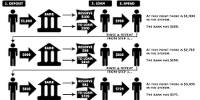Banking all functions of a bank in the course of its business may be termed as banking. In the Banking Companies Act, 1991 (Act 14 of 1991), the word “banking” has been defined to mean the accepting, for the purpose of lending or investment, of deposits of money from the public, repayable on demand or otherwise, and withdraw able by cheque, draft, order or otherwise. But any company which is engaged in the manufacture of goods or carries on any trade and which accepts deposits of money from the public merely for the purpose of financing its business is excluded from being deemed to transact the business of banking.
Banking, transactions carried on by any individual or firm engaged in providing financial services to consumers, businesses, or government enterprises. In the broadest sense, a bank is a financial intermediary that performs one or more of the following functions: safeguards and transfers funds, lends or facilitates lending, guarantees creditworthiness, and exchanges money. These services are provided by such institutions as commercial banks, central banks, savings banks, trust companies, finance companies, life insurers, and investment bankers.
Banker
- “A banker is a dealer in debts, his own and other people.”
– Geoffrey Crowther
- “Any person carrying on the business of banking is a banker.”
– British Stamp Law (1881)
- “A Banker is one who in the ordinary course of his business honors cheques drawn upon him by persons from and for whom he receives money on current accounts”
– D. H. L. Hart
















